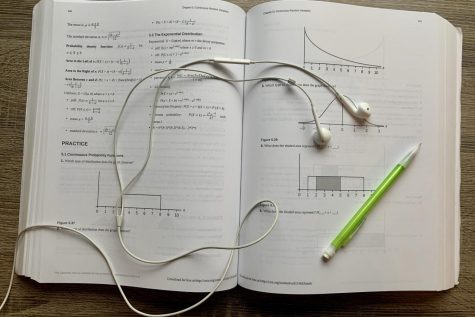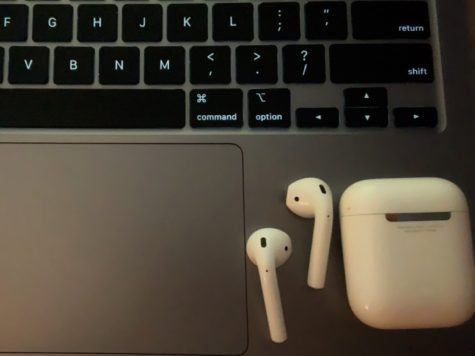The Power of Music
 Check out our Playlist on Spotify
Check out our Playlist on Spotify
How Music Affects Athletics
From listening before a practice all the way to a big game, music is undoubtedly a great way to get your energy up and adrenaline pumping. Many athletes in high school, collegiate, and professional sports listen to music as a pregame ritual to get them ready for the next few hours on the field or court. With music playing it is a way for athletes to tap into their sport and block the rest of what is going on around them out. In many cases, music plays all the way up until the first whistle, during time-outs, and small breaks. This is just another way for the athletes to be energized and pumped for the competition that’s ahead of them.
For some, the music they listen to before big games often helps distract them from getting too nervous but also allows for some upbeat music to energize them. “If I do not listen to music before games, I would be less ready and eager to play and would probably allow myself to overthink before games and get myself more nervous,” expresses Amanda Robbins ’22.
Looking deeper into it, music unlocks an emotional side of the brain that creates a path for athletes to perform better. Nicholas White, from Global Sports Matter shares that, “Music does more than excite and hype an athlete. It activates the amygdala, which is the section of the brain that processes emotions… When the amygdala is active it increases our ability to consolidate memories.”

Music and certain songs unlock certain memories for athletes, which is why “pre-game rituals” are a thing, and the same songs are often listened to before games. Those athletes wearing headphones while they warm up are actually stimulating parts of the brain to heighten skills and memory”. Having a memory attached to a big win game often makes a play more energized as that memory is unlocked when the song is playing.
At a sporting event, the music you hear playing around you is, without a doubt, always music that will get you ready to play. Before games, the only acceptable music playing is “Rap with heavy bass and intense lyrics,” shares Luke Wang ’22. Having this loud upbeat music that teams are able to warm up to creates an environment that is energized, but also increases their ability to play.
“Findings show that syncing the tempo of the music to an athlete’s heart rate can have powerful outcomes, such as improved stamina, speed and athletic performance…You want to try to match your music tempo to your desire to work” says Karageorghis’ from PBS.
Although a lot of people listen to music solo before games in headphones, it is just as much an important pre-game must for teams.
“Our team usually listens to music together on the bus to away games or during warm-ups to get us excited. The usual music is sing-along songs like Kesha, Taylor Swift, and any of the music we listened to growing up. Without music, the team still does work hard, but music has such a positive impact on us and our game,” says Ellie Maxwell ’22.
From the type of music you listen to who you listen to it with, Music can help improve all aspects of an athlete’s performance during a game or even just a practice.
Tune Down The Stress
Every day, people are going through their lives stressed and anxious. Anxiety and stress can take a large toll on a person’s body. People everywhere constantly talk about how stressed they are, and/or they are dreading what is to come. Society puts pressure on individuals on top of their average stress and anxiety, and from some people, everyday things have become extreme. Music can help both physical and mental health in many different ways, along with eliminating extra stressful and anxious thoughts.
 There are many different ways music can impact certain individuals. A person’s music taste can actually also reveal a lot about their personality. According to CNN, “Listening to mellow music can make us feel sad, so our brain may release a pleasing hormone to soothe us – and empathizers may get a bigger dose since the region of their brain responsible for regulating the chemical’s release is larger. Systemizers’ brains are bigger in regions responsible for recognizing patterns, so when they hear intense or highly structured music they may prefer it for its complexity.” When a person takes a step back and examines the type of music they listen to, they may be able to uncover their true emotions.
There are many different ways music can impact certain individuals. A person’s music taste can actually also reveal a lot about their personality. According to CNN, “Listening to mellow music can make us feel sad, so our brain may release a pleasing hormone to soothe us – and empathizers may get a bigger dose since the region of their brain responsible for regulating the chemical’s release is larger. Systemizers’ brains are bigger in regions responsible for recognizing patterns, so when they hear intense or highly structured music they may prefer it for its complexity.” When a person takes a step back and examines the type of music they listen to, they may be able to uncover their true emotions.
Maryfei Berrigan ’23, a student at HBHS, says “I like to listen to music while doing homework, or cleaning my room. It really helps me stay on track and not get too bored.” Music can be relatable and send deep messages to others, helping them understand they are not alone in this world. This can be motivating and can stop people from giving up.
Some people who struggle with stress and anxiety participate in music therapy. Music therapy is different from regular therapy because it does not involve very much verbal communication. “Music therapists use a person’s responses and connections to music to encourage positive changes in mood and overall mental mindset. Music therapy can include listening to music or creating music with instruments of all types.”(MedicalNewsToday) People may not even realize it, but just listening to music on the radio or through their headphones could be benefiting their mental health in more ways than one. “During a long school day, I look forward to the drive home and listening to music,” says Emma Hutchinson ’22, a student at HBHS.
Music is something that truly can bring individuals together. Anyone can make music. Whether singing or humming, clapping, playing instruments, or even just tapping your fingers on the table to a certain beat, music can be created in limitless ways. Hailey Yarusso ’23, a student of HBHS explains how she finds that music can really connect her to other individuals. “I spend a lot of time singing, and participating in musicals, and plays. Making music and singing with other people really creates deep connections” says Yarusso ’23.
Harvard Health explains, “Like any sound, music arrives at the ear in the form of sound waves. The external ear collects sound waves, and the ear canal funnels them to the eardrum. As the waves strike the eardrum, they cause it to vibrate. The vibrations are relayed along the chain of tiny bones in the middle ear until they reach the third bone, the stapes, which connects to the cochlea.” After this, the brain processes the sound vibrations in a complicated process bringing them to the brain’s reward center. This eases any pain and anxiety a person may be experiencing.
Music has many different effects on a human’s emotional, and physical health. When a person finds music that they like and can truly connect to, they automatically become happier. It is important for all individuals to process and understand their own emotions, and music can truly help eliminate extra stress and anxiety.
Can Music Help You Focus?
Do you like to listen to music while studying? If yes, you are not alone. Many people find that music aids in focus and blocks out background noise. Depending on what kind of music you listen to while studying or doing a task that requires concentration, you could be helping or hurting yourself. The key to making music a helpful tool is to establish the line between songs that stimulate the brain and songs that distract.
 “I almost always listen to music while studying and it’s usually country. It helps to eliminate the background noise so I can focus on my work.” Said Meg Coutu ‘22. The University of Wollongong in Australia would agree that if music puts you in a good mood, it helps with motivation. In 1990, a study was conducted on students who were studying for a test. When they listened to BritPop, their scores increased. Their conclusion to this study was that better moods often produce more willpower and determination to finish tasks. Country music, as Meg mentioned she listens to while studying, is usually more upbeat and has a happier tone. Because she enjoys country music, she is more likely to finish assignments and work through problems at a more focused pace.
“I almost always listen to music while studying and it’s usually country. It helps to eliminate the background noise so I can focus on my work.” Said Meg Coutu ‘22. The University of Wollongong in Australia would agree that if music puts you in a good mood, it helps with motivation. In 1990, a study was conducted on students who were studying for a test. When they listened to BritPop, their scores increased. Their conclusion to this study was that better moods often produce more willpower and determination to finish tasks. Country music, as Meg mentioned she listens to while studying, is usually more upbeat and has a happier tone. Because she enjoys country music, she is more likely to finish assignments and work through problems at a more focused pace.
Music is also proven to reduce stress. Stress and test anxiety are factors that are just as important as studying. We are better able to recall information when we aren’t stressed or overly anxious. The University of Cambridge University did a study and has recommended that those who tend to be anxious while studying or test-taking should listen to rap. Similar to country music, hip-hop and rap have an upbeat rhythm and usually inspire motivation. If rap isn’t your thing, listen to music that makes you relaxed. Florida National University says that getting a massage and listening to music have similar effects.
While music has many benefits, it is possible for it to become a distraction. Excessively loud music may block the brain’s ability to concentrate solely on the work in front of you while extremely wordy music may distract your brain from being able to retain phrases or facts. It’s all about balance. “If my music is too loud, I often find myself unable to really focus on my work. I don’t find that country music distracts me too much– it actually puts me in a better mood.” Said Sophia Jordan ‘23.
If you are using your working memory for studying, music also may not be the best option. Your working memory is being used when you try to remember things in a sequence, on a list, or steps to solve a problem. Music has been shown to lower one’s abilities to memorize things that require working memory. Sometimes music can also alter the ability to comprehend reading.
It’s not the same for all types of people. Introverts have a lower tolerance for the volume or wordiness of music while extroverts may focus better with the music louder than recommended. It’s important to understand what type of person you are and act accordingly. It is also important that you stream commercial-free music while you study. Commercials are distracting and will create an unnecessary pause in your work session.
Overall, the answer is not as clear as it might seem. Can music aid in focus? Yes, it can. Can music aid in distraction? Yes, it can do that too. The key is trying out new music, understanding what kind of person you are, and gauging what kind of music would be best for your current assignment. For more information on music and how it affects studying, visit Healthline.com.